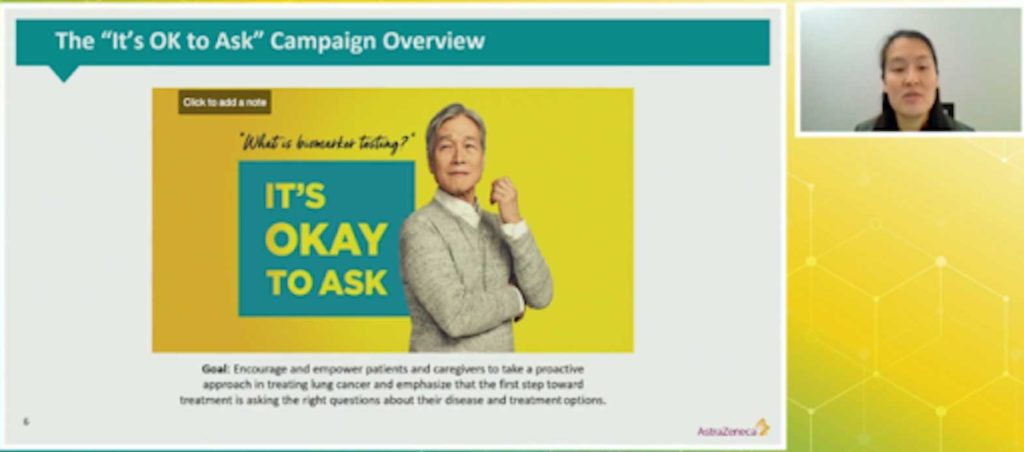Astra Zeneca panel addresses lung cancer among Asian Americans

Astra Zeneca recently launched “It’s Okay to Ask” to focus on lung cancer among Asian Americans.
In midst of a deadly pandemic comes the bit of good news that Stage 4 lung cancer is no longer a death sentence, and there are now other treatment options aside from chemotherapy.
This was announced at the recent “It’s Okay to Ask” virtual panel by Astra Zeneca on lung cancer among Asian Americans. The “It’s Okay to Ask” campaign was launched to encourage patients and caregivers to take a proactive approach in treating lung cancer by asking the right questions about the disease and treatment options.
Panelists debunked myths that a lung cancer, the most common cancer-related cause of death in both men and women, only afflicts smokers. In the Vietnamese, Chinese and Japanese populations, the number of non-smokers diagnosed with lung cancer has been increasing, with patients usually exhibiting symptoms like coughing, shortness of breath, among others.
The online event was moderated by New York assistant professor and hematology/oncology fellow Elaine Shum, MD. On th panel were New York assistant clinical professor Songchuan Guo, MD, PhD; certified hematology and oncology specialist with over 30 years of experience Kin Y. Lam, MD; Chicago Associate Professor Young Kwang Chae, MD, MPH, MBA; and chef/owner of Blue Dragon in Massachusetts Ming Tsai, who was inspired by his wife’s lung cancer treatment.
Shum advised that people with Stage 4 lung cancer should no longer feel afraid of this scary diagnosis because huge advancements are being made on how to address lung cancer. She said chemotherapy is not the only option as there already are other targeted treatments.
“We just have so many options nowadays. If the first option may not work after a while, we have other options. We just have so much research going on that there is almost always something else that we can use,” Shum emphasized.
Recent studies show that most common lung cancer is Non-Small Cell Lung Cancer (NSLC), which accounts for 85% of lung cancer cases. Aside from smoking, genetic mutation is one of the biggest lung cancer triggers.
The significant discovery of biomarkers (a molecule measured in tissues, blood or body fluids), revealing distinct traits of an individual’s lung cancer and its mutation in organs other than the lungs, has led to breakthroughs in treatment.
The most common biomarker — EGFR (Epidermal Growth Factor Receptor) a protein found on the surface of some cells – is found in 50 percent of Asians. Imaging tests such as chest X-ray, CT (or CAT) scan, MRI, PET, or a bone scan, can detect any tumors, their sizes and if they have spread to lymph nodes or another part of your body.
The panelists took turns in explaining that culture, tradition as well as stigma can cause additional burdens to a patient’s family. Up to 56% of the population 56% still think that lung cancer patients are partly to blame for their illness. Blame on oneself or others, or belief in karma or divine punishment can cause embarrassment and inhibit the desire for treatment.
The hesitation to seek treatment has been boosted by the current Covid-19 pandemic, which has made people avoid hospitals. Job loss leading to loss medical coverage due to the lockdowns adds to the hesitation. Shum said such disruptions could lead to more cancer deaths because.
She advised everyone to watch out for cough that don’t go away and even gets worse despite the usual treatments and antibiotics; weight loss and loss of appetite; and anything that seems out of the ordinary such as seizures, memory loss, vision changes, aand weakness.
“A fairly large mass growing in their lungs and patients may not have any symptoms and would only be found incidentally.” Shum warned. “Lung cancer can present in many ways and sometimes it does not present itself at all so keep up to date with their physical exams and seek medical care with anything that seems out of ordinary.
Shum acknowledged that the high cost of cancer treatments can be discouraging. “But we don’t want patients to be stopped, prevented or not seek medical care because they think they cannot afford it or have financial trouble because of the treatment they will be having and might need,” Shum exhorted.
“Medical insurance, as well as a lot of drug companies, for the most part, cover a lot of this cost. Those with no insurance can turn to organizations have a lot of patient assistance programs aside from availing of treatment in public hospitals that also have these programs.”
Katy Miller, head of Astra Zeneca Oncology’s U.S. franchise, said the company’s “It’s Okay To Ask” campaign is part of its r unwavering commitment to improving outcomes for patients, particularly of lung cancer patients.
“That is one reason Astra Zeneca created this this program, to empower patients and their caregivers to take a proactive approach in facing lung cancer.” The program provides patients with helpful resources and finding innovative solutions like biomarker testing to ensure they have a complete and secure diagnoses, she added.
She said Aztra Zeneca is developing a targeted once-daily pill therapy that minimizes the disruption to daily life, and provides NSCLC patients survival rates that are significantly higher than with other therapies.
Miller urged everyone to start a conversation by visiting www.TreatYourLungCancer.com.

